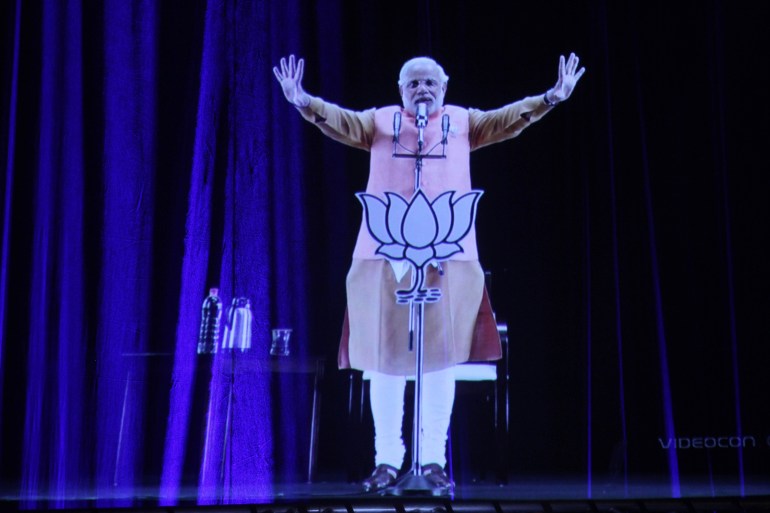A small crack in one of the pillars supporting the world’s largest lift-irrigation project was the opening that Sunil Kanugolu was looking for as he shepherded the election campaign of the opposition Congress party in the southern Indian state of Telangana late last year.
Up against the regional Bharat Rashtra Samithi (BRS) party whose leader K Chandrashekhar Rao had ruled Telangana since the state’s birth a decade earlier, the Congress, riding on disenchantment over alleged corruption and nepotism, was polling well.
But Kanugolu, the in-house election mastermind of the Indian National Congress or Congress party, wanted something more — something that would drive home his party’s advantage, based on a mantra that’s central to his approach.
“No election is ever won by logic. Emotions win elections,” the 40-year-old says often, according to a close confidant who requested anonymity.
In Telangana, a member of Kanugolu’s team found a photograph of the small crack in the Kaleshwaram lift irrigation project that morphed into a poll strategy to topple the BRS from power.
Mock ATM machines, branded as “Kaleshwaram ATM”, were set up in different parts of Telangana and photos of Congress workers inserting fake currency notes into the slot — which was the chief minister’s mouth — went viral. In the story that the Congress was telling, the project, constructed at a staggering cost of $9.8bn and being touted as a symbol of Telangana pride, was a crumbling testament to the BRS’ brazen corruption.
The campaign was a classic example from Kanugolu’s election strategy playbook.
“I’m not a believer in fighting elections with multiple, three-four-five items. There has to be one single narrative that you keep pushing and get the entire party, entire ecosystem, resources at your disposal to rally around. Other issues are sprinklings that you add to speeches and stuff like that,” Kanugolu’s confidant recalls him saying.
In Telangana, that “sprinkling” included publicising welfare schemes the Congress would implement for women, farmers, youth, the elderly and poor families if voted to power. “Within about a week there was a three to nine percent swing in the vote share on the basis of the promises,” a researcher with Inclusive Minds, the Bengaluru-headquartered election consultancy firm that Kanugolu runs for the Congress, told Al Jazeera.
The Congress won a clear majority and formed the government in Telangana.
A decade ago, Kanugolu, a former consultant with McKinsey, was a member of the team that strategised, shaped and implemented Narendra Modi’s prime ministerial campaign.
Now, a decade later, he is one of the top political consultants in the country and is working with the Congress to bring down PM Modi in the national elections that began on April 19 with the first phase of voting, and will be conducted in seven phases ending on June 1.
But the challenge Kanugolu faces is not just from Modi and his Bharatiya Janata Party (BJP), but his own Congress party as well.
The Congress party has been out of power federally for 10 years, and has just 52 members of parliament (MPs) in the 543-member lower house of Indian parliament, the Lok Sabha.
In May 2022, when Kanugolu officially joined the Congress, he was inducted into an eight-member “Task Force-2024”. The plan was to let him lead the Congress’s campaigns in nine states that went to polls for their regional governments in 2023 — and then tackle the 2024 general elections.
But internal politics within the Congress derailed the state election plan and the task force failed to take off, forcing Kanugolu to narrow his focus and ambition.
He is now working on a plan B, focussing on 100-120 constituencies where the Congress either has a winning chance or wants to put up a fight as a matter of prestige. The general hired to win India’s 2024 election war by launching a full-frontal attack on Modi’s BJP is now busy managing a hundred or so snipers and trying to make sure they don’t miss their targets.
“Political consultants are not magicians. They play an important but limited role if a party is in good shape,” Sanjay Kumar, co-director of Lokniti, a New Delhi-based research organisation that studies public opinion during and between elections, told Al Jazeera.
“Is there a magician who can make the Congress win the 2024 elections? Even 50 magicians can’t make the Congress win.”

Crack team
Ahead of the 2014 national election, Modi, then the chief minister of the western state of Gujarat, roped in public health specialist Prashant Kishor to create a tech-savvy, data-driven election consultancy, much like future US President Barack Obama’s in 2008, to catapult him on to the national stage.
Kishor in turn brought in Kanugolu, among other bright, ambitious professionals, and together they set up Citizens for Accountable Governance (CAG). They conducted extensive surveys to understand what motivated people’s voting decisions, studied past voting patterns, tested what resonated with people and created a campaign strategy for the BJP by putting Modi at its centre.
“There are only two ways to win elections — either you make your line big, or you cut the other person’s line,” Abhimanyu Bharti, a former political consultant with CAG, who now runs the online School of Politics, told Al Jazeera.
The CAG used both these strategies effectively. It pulled out all the stops to launch a powerful campaign to exploit the rising anger against the Congress’s inefficient and corrupt government at the centre. Millions of dollars were spent to create Brand Modi and to project him as an able administrator, a decisive leader who had brought development, foreign investment and prosperity to his home state of Gujarat.
A blitzkrieg of 3D vans in almost every Lok Sabha constituency beamed Modi’s hologram image, drawing large crowds to listen to him talk about his vision for India and promise of “achche din” (good days).
The BJP won a comfortable majority — the first for any party in 30 years — and Modi became the prime minister.
While Kishor left the BJP soon afterwards, Kanugolu stayed on. Along with others, he created the Association of Billion Minds (ABM), the BJP’s in-house election machine that is often referred to as “Amit Shah’s team”, after Modi’s de facto deputy and India’s home minister.
In 2017, the BJP won in Uttar Pradesh, India’s largest state that sends 80 MPs to Lok Sabha. That victory was credited to ABM, led by Kanugolu. “Data analysis, political insight, agenda-setting and media communication are his forte,” a rival political consultant told Al Jazeera on the condition of anonymity.
After helming a string of wins, Kanugolu chose to move on from the BJP and set up his own political consultancy in Bengaluru – Mindshare Analytics, working primarily for political parties in southern India.
According to his friends and colleagues, Kanugolu maintains that he is against the BJP’s religion-based politics — though he worked with the party for several years and helped it consolidate its power across India. But in private conversations, they say, Kanugolu acknowledges that the reason he left Modi’s side was something more basic.
He was bored.
If Kanugolu was no longer excited by the BJP, a party that has been on a winning roll over the past decade, the Congress’s struggles in this period were, in part, what drew him to the party, his confidant said. Kanugolu “thrives on challenging situations,” he said.
The self-described “backroom boy” also deeply covets his privacy, and doggedly avoids the press and limelight. He declined Al Jazeera’s request for a formal interview.
Al Jazeera spoke with more than a dozen of his current and former colleagues, friends as well as peers, to piece together a portrait of a man who wields significant political influence but operates in the shadows.
And in the secretive world of political consultancies, where people shift jobs and loyalties often, most spoke about him only on the condition of anonymity.
![Sunil Kanugolu (right) seen here with Karnataka Deputy Chief Minister DK Shivakumar (centre). Kanugolu is credited with having masterminded the Congress party campaign that brought it back to power in the southern Indian state in 2023 [Photo from X]](https://www.aljazeera.com/wp-content/uploads/2024/04/Kanugolu-1-1713496239.jpeg?w=770&resize=770%2C433)
Staying incognito
Kanugolu is tall, bearded and well-built — yet he often manages to stay invisible in plain sight.
The only senior Congress leader whose photograph is missing from the party’s website, he has been the subject of news articles that have mistakenly carry his brother’s picture.
Last year, his confidant recalled, when Kanugolu was leading the Congress’s campaign in the high-stake Karnataka state elections, “I was to meet him at Bengaluru’s Taj West End hotel for lunch”.
Somehow news got out and several aspiring candidates turned up at the green, leafy heritage hotel in Karnataka’s capital.
They didn’t know what he looked like, but they hung around, looking for him while Kanugolu, “a whiskey-drinker and a militant meat-eater who has not had a single vegetarian meal in 25 years”, sat with his friend in the lawn, out in the open, eating and chatting. And then he left.
“Everyone knows just basic s*** about him,” a former communication consultant with Inclusive Minds told Al Jazeera.
The consultant said the public knows Kanugolu is originally from Karnataka, belongs to a backward community, Balija, “like Chiranjeevi, the Telugu actor”, but grew up in Chennai in the state of Tamil Nadu, where he studied computer engineering. He then went to study at New York University, before joining McKinsey. People also know that he is fluent in five languages — Tamil, Telugu, Kannada, Hindi and English – but “listens more than he talks.”
Unlike Kishor, India’s top political analyst who is flamboyant, media savvy and boastful about his political predictions and campaigns, Kanugolu prefers to remain invisible and maintains that credit for election victories must lie with the people, including candidates and senior party leaders whose “necks are on the line”.
Operating incognito in India’s buzzing, chaotic, often hostile electoral space has a logic of its own. And it brings unlikely power.
It keeps the public focus on parties and their leaders, and gives the impression that their popularity is not orchestrated, but organic — a genuine groundswell.
During elections, when cash and favour fly fast, and suspicion runs deep, most election consultancies have “political intelligence” teams on the ground, a euphemism for what a former ABM employee said is “a tactical, SWOT unit”.
People are hired and planted not just in rival camps, but also to keep an eye on the party’s own leaders.
In this scenario, invisibility conveys a lack of political ambition that helps political leaders trust their consultants. It also adds a bit of mystique.
“I think there is a very concerted effort to hold that sort of enigmatic personality and it’s worked well for him,” a researcher with Inclusive Minds said.
That’s why, Kanugolu’s confidant said, the strategist refused a Congress offer — made by the party’s face, Rahul Gandhi, no less — of a seat in the Rajya Sabha, the upper house of India’s parliament.
But being incognito doesn’t mean being timid.
“These management consultants from McKinsey and others,” the rival political consultant said, “have big egos”.
And even within the Congress, India’s oldest party, Kanugolu is in many ways his own boss — setting his own red lines.

The master strategist
If the crack in the pillar of the irrigation project was Kanugolu’s eureka moment in Telangana, the campaign he framed for the Congress in Karnataka in 2023 showed an aggression that analysts say is often missing from the party’s quiver.
Amid allegations that under the then-BJP government of the state, contractors needed to pay 40 percent of project earnings as bribes, Kanugolu’s team launched a “PayCM” campaign, which included posters with a QR code that looked like the BJP chief minister’s face.
On scanning, it redirected to a website that listed the alleged corruption charges against the BJP government. The Congress won the elections to the state, one of India’s economic powerhouses, and Kanugolu was made chief adviser to the chief minister, with cabinet rank.
Yet, late last year, when the Congress asked Kanugolu to take charge of the general elections, he declined to take “full responsibility”, saying it was too late. “You have to start fighting elections the day after you lose the previous election. That’s how you build a national election, especially when you’re fighting someone like Modi,” Kanugolu said later, according to his confidant.
Still, Kanugolu, who according to a former colleague, operates on the “fail fast, think agile” motto, is playing a prominent role in the campaign. He has been flying to New Delhi often, to hand over “dossiers” on the best candidates to Rahul Gandhi, and to discuss issues to focus on — such as a nationwide caste census that could win the party the support of marginalised communities — and traps to avoid — such as talking about the newly consecrated Ram Temple.
Inaugurated by Modi in January, the temple is a central pillar of the BJP’s election campaign. It is built on the ruins of a 16th-century mosque demolished by Hindu extremist activists, and the Congress refused to attend the inauguration. Kanugolu, according to his confidant, has told Congress leaders to skirt any public conversation around the temple — which he believes is a subject that can only benefit the BJP.
Kanugolu has also been visiting states where election “war rooms” are operational. Surveys are under way to gauge people’s mood and test the impact of the Congress party’s campaign.
The Congress, whose bank accounts have been frozen since February over a delay in filing income-tax returns, plans a big campaign push in these constituencies closer to polling days.
Of India’s 28 states, the Congress is in power in only three, of which Karnataka and Telangana were won by Kanugolu.
Along with working on national elections, his focus on three specific states has been slowly sharpening: Odisha in the east where elections are being held simultaneously with general elections, and two states where polls for the provincial government are scheduled for later in the year — Maharashtra and Haryana.
These days, Kanugolu frequently refers to the need to focus on individual states to stitch together a nationwide victory. “You need to fight national elections by fighting and winning the states,” Kanugolu told some members of his team, according to the confidant.
And to be able to win anywhere, a party needs a leader in whose image its campaign can be built. Kanugolu knows that well: He helped chisel the brand that boosted Modi to power. Now he’s trying to do something similar — yet very different — for Rahul Gandhi.
![Congress leader Rahul Gandhi addressing supporters in the rain in Mysuru, Karnataka, India in an image that went viral — and was part of a carefully crafted image management strategy devised by Kanugolu [Courtesy Indian National Congres]](https://www.aljazeera.com/wp-content/uploads/2024/04/Rahul-Gandhi-Rain-1713497398.jpeg?w=770&resize=770%2C428)
Battle of perception
The BJP, a cash-rich party with more than 180 million primary members, has social media and WhatsApp volunteers in every neighbourhood to push its campaign message, which Kumar of Lokniti calls “the nationalism bouquet”.
“The construction and consecration of the Ram Temple, direct benefit schemes for farmers and the poor, the fight against corruption and making India a world leader are the flowers in that bouquet,” he said.
According to a Lokniti survey released last week, 62 percent of the people in India are worried about growing unemployment and 55 percent are anxious about the rise in corruption in the last five years. But Kumar says there is a disconnect between voters’ concerns and voting patterns: Modi remains widely popular, according to most polls.
In a battle of perception and personality, Modi’s image as a decisive, incorruptible nationalist, a protector of Hindus and a world leader – an image that Kanugolu helped build — helps the BJP.
The perception that Rahul Gandhi, the Congress’s undeclared prime ministerial candidate whose great-grandfather, grandmother and father were prime ministers of India, has not earned the right to lead the Congress party, but has inherited it, also helps Modi. The BJP and its supporters have long portrayed Rahul as a “Pappu” (an intellectual infant).
Now Kanugolu is working on changing Gandhi’s image.
In September 2022, Rahul Gandhi set out on his 150-day Bharat Jodo Yatra (Unite India March), walking from India’s southernmost tip near the Indian Ocean to Kashmir in the north to protest against the BJP’s Hindu-majoritarian politics and policies.
Kanugolu took charge of the Telangana and Karnataka legs, stitching together some of the most iconic moments of that march. One day Gandhi delivered a rousing speech in pouring rain; the next day he walked with the family of Gauri Lankesh, a journalist and a critic of right-wing extremism who was murdered outside her home in 2017.
Kanugolu’s team turned all these moments and more — Rahul Gandhi walking in a white collared T-shirt in winter, interacting with kids, Muslims and Christians — into carefully crafted images and poignant short video clips with rousing music and devotional chants. They amplified these on social media.
It made the march look like a mass movement and changed Gandhi’s image from being just a political opponent, to a moral force standing against the BJP’s divisive politics.
Kanugolu has a plan to build on that for Gandhi’s makeover. In meetings with his team, he has spoken about the politician’s “phenomenal” understanding of complex issues.
Now, he’s trying to get the country to buy into that message.

Course correction
“You should have a strong narrative, a credible story to tell that should focus on why people should vote for you and not your rivals. If you have a story, people will vote for you,” said K Nageshwar, professor, political analyst and YouTuber who has won elections in Andhra Pradesh twice as an independent candidate.
In a nation that has been on an accelerated rightward shift since 2014, when the BJP under Modi was voted to power, many analysts believe the 2024 election is a watershed moment. Who wins, and by what sort of margin, will decide whether India continues down this path.
For the Congress, which considers itself the moral custodian of India’s secular democracy, at stake is its legacy as the national party that helped build a newly independent nation — as well as the party’s future.
And for Kanugolu, a carefully built reputation is on the line. His worth as a strategist in the battle of 2024 doesn’t just depend on his ability to wrench victory for the Congress in the face of predicted defeat, but also how much he can dent the BJP’s claims of efficient governance over the 10 years that they have been in power.
From ads that question the Modi government’s claims that it has brought development, economic prosperity and jobs, to being nimble and rethinking campaign strategies that aren’t working, Kanugolu is shaping the Congress party’s election strategy even with one hand tied.
Earlier this month, the Congress and its ally, Trinamool Congress, tried to tell a story about the BJP’s alleged corruption. Washing machines, fully automatic and top-loading ones, were rolled onto the stage at the Congress’s press conference in New Delhi to capitalise on a statement made by Finance Minister Nirmala Sitharaman that defectors from all parties, including those facing criminal investigations, were welcome to join the BJP.
Congress leaders beamed as they shoved dirty clothes into washing machines and pulled out squeaky clean, white ones.
But a social media sentiment and engagement survey by Kanugolu’s team showed that the washing machines were neither making people laugh, nor adding power to the Congress’s “Modi Washing Powder” charge.
The washing machines have since disappeared, and the Congress is back to talking about the need for a caste census. India has not published a census tracking the demographic data of key castes since 1931. Many experts say this gap in information has meant that the country’s affirmative action policies are inadequate in helping India’s most marginalised castes, and are often misguided.
A new caste census could, in theory, be a blueprint to fix that — estimates suggest that a majority of India’s 1.4 billion people belong to disadvantaged castes.
Rahul Gandhi has made the need for a nationwide caste census a central campaign plank. Such a census, he claims, will show that under BJP rule, the nation’s wealth, top posts and jobs have gone only to the upper castes, who make up just 15-20 percent of the total population.
In its manifesto, the Congress has promised to conduct the survey and implement schemes to correct this imbalance.
“You need to make them understand what it means for them,” Kanugolu told his team about the caste census recently. “You need to make people feel that they’ve been cheated, taken for a ride, that they’ve been betrayed all these years. And then change the entire thing to how their life could be different, better.”
Kanugolu knows that his party’s caste narrative has been weak so far, says his confidant. Still, the Congress is hoping for an undercurrent against the BJP that swings votes in its favour and brings India’s grand old party back to power.
“No point brooding over what is not in your hand,” Kanugolu told his team recently, according to the confidant, outlining his philosophy days before India’s mammoth election starts.
“Think of the future and move forward.” And keep looking for cracks.
Read More: World News | Entertainment News | Celeb News
Aljazera









